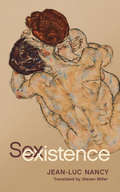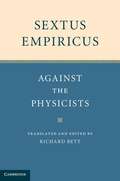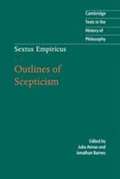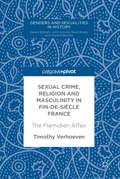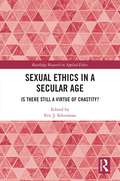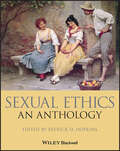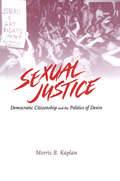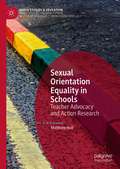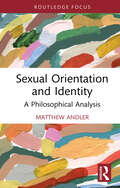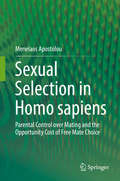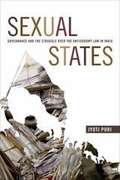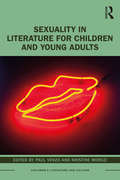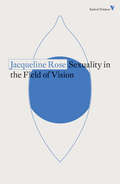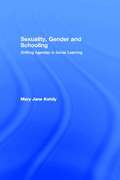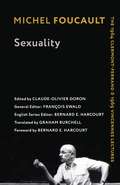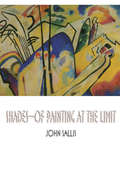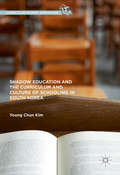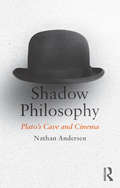- Table View
- List View
Sexistence
by Jean-Luc NancySex, more than just a part of our experience, troubles our conceptions of existence. Drawing on a fascinating array of sources, ancient and modern, philosophical and literary, Jean-Luc Nancy explores and upholds the form-giving thrust of the drive. Nancy reminds us that we are more comfortable with the drama of prohibitions, ideals, repression, transgression, and destruction, which often hamper thinking about sex and gender, than with the affirmation of an originary trouble at the limits of language that divides being and opens the world.Sexistence develops a new philosophical account of sexuality that resonates with contemporary research on gender and biopolitics. Without attempting to be comprehensive, the book ranges from the ancient world through psychoanalysis to discover the turbulence of the drive at the heart of existence.
Sextus Empiricus
by Richard BettSextus Empiricus' Against the Physicists examines numerous topics central to ancient Greek inquiries into the nature of the physical world, covering subjects such as god, cause and effect, whole and part, bodies, place, motion, time, number, coming into being and perishing and is the most extensive surviving treatment of these topics by an ancient Greek sceptic. Sextus scrutinizes the theories of non-sceptical thinkers, and generates suspension of judgement through the assembly of equally powerful opposing arguments. Richard Bett's edition provides crucial background information about the text and elucidation of difficult passages. His accurate and readable translation is supported by substantial interpretative aids, including a glossary and a list of parallel passages relating Against the Physicists to other works by Sextus. This is an indispensable edition for advanced students and scholars studying this important work by an influential philosopher.
Sextus Empiricus and Ancient Physics
by Algra, Keimpe and Ierodiakonou, Katerina Keimpe Algra Katerina IerodiakonouThe two books of Sextus Empiricus' Against the Physicists have not received much attention in their own right, as sustained and methodical specimens of sceptical philosophy. This volume redresses the balance by offering a series of in-depth studies on them, focusing in particular on their overall argumentative structure and on the various ways in which their formal features relate to their contents, showing how Sextus' procedures vary from one section to the other, and throwing new light on the way he was using his sources. It follows Sextus' own division of these two books into nine successive topics, namely god, cause, wholes and parts, body, place, motion, time, number, coming-to-be and passing-away. These nine chapters are preceded by an introduction which discusses a number of general features of Sextus' scepticism and links the conclusions of this volume to some recent discussions on the scope of ancient scepticism.
Sextus Empiricus: Outlines of Scepticism (Cambridge Texts in the History of Philosophy)
by Jonathan Barnes Julia Annas Karl Ameriks Desmond M. Clarke Sextus Empiricus StaffOutlines of Scepticism, by the Greek philosopher Sextus Empiricus, is a work of major importance for the history of Greek philosophy. It is the fullest extant account of ancient scepticism, and it is also one of our most copious sources of information about the other Hellenistic philosophies. Its first part contains an elaborate exposition of the Pyrrhonian variety of scepticism; its second and third parts are critical and destructive, arguing against 'dogmatism' in logic, epistemology, science and ethics - an approach that revolutionized the study of philosophy when Sextus' works were rediscovered and published in the sixteenth century. This volume presents the accurate and readable translation which was first published in 1994, together with a substantial new historical and philosophical introduction by Jonathan Barnes.
Sextus Empiricus’ Neo-Pyrrhonism: Skepticism as a Rationally Ordered Experience (Synthese Library #457)
by Plínio Junqueira SmithThis book offers a comprehensive interpretation of Sextus Empiricus based on his own view of what he calls the distinctive character of skepticism. It focuses on basic topics highlighted by this ancient philosopher concerning Pyrrhonism, a kind of skepticism named for Pyrrho: its concept, its principles, its reason, its criteria, its goals. In the first part, the author traces distinct phases in the life and philosophical development of a talented person, from the pre-philosophical phase where philosophy was perceived as the solution to life's disturbing anomalies, through his initial philosophical investigation in order to find truth where the basic experience is that of a huge disagreement between philosophers, to the final phase where he finally recognises that his experience is similar to that of the skeptical school and adheres to skepticism. The second part is devoted to explain the nature of his skepticism. It presents an original interpretation, for it claims that the central role in Sextus’ Neo-Pyrrhonism is played by a skeptical logos, a rationale or way of reasoning. This is what unifies and articulates the skeptical orientation. The skeptic goes on investigating truth, but in a new condition, for he is now tranquil, and he has a skeptical method of his own. He has also acquired a special ability in order to balance both sides of an opposition, which involves a number of different skills. Finally, the author examines the skeptical life generated by this philosophical experience where he lives a life without opinions and dogmas; it is an engaged life, deeply concerned with our everyday actions and values. Readers will gain a deeper insight into the philosophy of Pyrrhonism as presented by Sextus Empiricus, as well as understand the meaning of anomalía, zétesis, epokhé, ataraxía, and other important ideas of this philosophy.
Sexual Crime, Religion and Masculinity in fin-de-siècle France: The Flamidien Affair (Genders and Sexualities in History)
by Timothy VerhoevenThis book explores a vital though long-neglected clash between republicans and Catholics that rocked fin-de-siècle France. At its heart was a mysterious and shocking crime. In Lille in 1899, the body of twelve-year-old Gaston Foveaux was discovered in a school run by a Catholic congregation, the Frères des Écoles Chrétiennes. When his teacher, Frère Flamidien, was charged with sexual assault and murder, a local crime became a national scandal. The Flamidien Affair shows that masculinity was a critical site of contest in the War of Two Frances pitting republicans against Catholics. For republicans, Flamidien’s vow of chastity as well as his overwrought behaviour during the investigation made him the target of suspicion; Catholics in turn constructed a rival vision of masculinity to exonerate the accused brother. Both sides drew on the Dreyfus Affair to make their case.
Sexual Ethics in a Secular Age: Is There Still a Virtue of Chastity? (Routledge Research in Applied Ethics)
by Eric J. SilvermanThis collection features essays from top experts in ethics and philosophy of love that offer varying perspectives on the value of a contemporary secular virtue of chastity. The virtue of chastity has traditionally been portrayed as an excellent personal disposition concerning the ideal ordering of sexual desire such that the person desires that which is actually good for both the self and others affected by his or her sexual desires and actions. Yet, for roughly the past half century chastity has been increasingly portrayed as an unnecessary ideal with few secular benefits that could not be otherwise obtained. Instead, chastity is sometimes portrayed as an odd kind of religious asceticism with few secular benefits. The essays in this volume ask whether there may be advantages to reconsidering a contemporary virtue of chastity. A recovered and reconceptualized concept of chastity can offer partial solutions to problems associated with externalized sexual desire, including sweeping patterns of sexual harassment, the high divorce/relationship-failure rate, and widespread pornography use. Sexual Ethics in a Secular Age will appeal to researchers and advanced students interested in the philosophy of sex and love, virtue ethics, and philosophical accounts of secularity.
Sexual Ethics: An Anthology (Blackwell Philosophy Anthologies)
by Patrick D. HopkinsAn accessible and engaging anthology of readings focused specifically on applied ethics issues of sexual morality Sexual Ethics: An Anthology addresses conceptual, ethical, and public policy issues about sex, providing a balanced and non-sectarian discussion of many of today’s most important and controversial moral topics. Covering a broad range of contemporary sexual ethics issues, this easily accessible textbook includes explications and point/counterpoint pieces on the definition of sex and sexual orientation, sexual harassment and rape law, sexual discrimination, age of consent, marriage and adultery, online affairs, gay marriage, polygamy and polyamory, sexual orientation change therapy, transgender and sex reassignment surgery, intersexed infants and surgery, pornography, prostitution, psychiatric classifications of sexuality disorders, and specific paraphilias. Organized around six broad themes—Consent, Marriage, Homosexuality, Transgender, Commerce, and Paraphilias—Sexual Ethics presents multiple sides of each issue, offering diverse perspectives on critical topics, supported by relevant philosophical arguments, position papers, psychological studies, government regulations, and court rulings. Sexual Ethics is particularly designed to provide a ready-made course in sexual ethics, with several major elements ideally suited for classroom instructors and students: Includes an introductory chapter on key definitional, conceptual, and theoretical issues Features “Framing Questions” for each section that address a major moral or policy issue and highlights the pro/con nature of the readings (e.g., How should we define rape? Should pornography be protected as free speech?) Features a short summary at the beginning of each reading, including the topic, major points, and conclusion, very helpful for instructor planning Features 15 “Discussion Starters” that help students start thinking critically and talking about sexual ethics before doing any reading Features 45 brief “Decision Cases” drawn from major media stories especially relevant to the college student context, including college virginity, male rape, child pornography on television, college sexual harassment, faux-bisexuality, fraternity party sex, transgender inclusion, race and sex, asexuality, bromances, campus pride groups, fetishes and kink, online sex, Title IX mandatory reporting, transgender sports competition, religious diversity and sex, sex education, feminists working at sexually exploitative jobs, cancel culture, and robot sex. These cases are ideal for class discussion, class presentations, and research paper topics.Sexual Ethics: An Anthology is an excellent textbook for undergraduate classes in applied ethics, sexual ethics, and gender studies, as well as related courses in sociology, public policy, marriage and family law, and social work.
Sexual Justice: Democratic Citizenship and the Politics of Desire
by Morris B. KaplanSexual Justice defends a robust a robust conception of lesbian and gay rights, emphasizing protection against discrimination and recognition of queer relationships and families. Synthesizing materials from law, philosophy, psychoanalysis and literature, Kaplan argues that sexual desire is central to the pursuit of happiness: equal citizenship requires individual freedom to shape oneself through a variety of intimate associations.
Sexual McCarthyism: Clinton, Starr, and the Emerging Constitutional Crisis
by Alan M. DershowitzDiscusses the issues at that time; the clarifications and comments are still of interest.
Sexual Orientation Equality in Schools: Teacher Advocacy and Action Research (Queer Studies and Education)
by Matthew HoltThis book explores how to help teachers become better advocates for sexual orientation equality in secondary schools. Examining this issue through the lens of qualitative emancipatory action research, a group of Australian teachers embarked on a journey of teacher advocacy. Critical theory has long highlighted teachers as key players in either challenging dominant social narratives, or else perpetuating oppressive systems of power through traditional forms of education. Despite this important role, the life stories of teachers, which contributed to the development of their beliefs and behaviours about sexual orientation are rarely considered in the development of anti-discriminatory policy, designing the curriculum and most importantly, in teacher training. This book suggests and frames a model for advocacy, whereby teachers engage with their personal beliefs about sexual orientation, with their role as a teacher, and commit to advocacy through action by promoting student safety, challenging heteronormative narratives and role modelling compassionate behaviours in their school environments.
Sexual Orientation and Identity: A Philosophical Analysis (Routledge Focus on Philosophy)
by Matthew AndlerSexual orientation and how we might understand it is a topic that arouses significant controversy. Is sexual orientation a natural or social phenomenon? Are categories such as 'queer' and 'straight' essential to the human condition or dependent on contingent cultural practices? While such questions have been considered from the perspectives of sociology and gender studies, they remain relatively underexplored from a philosophical standpoint.In this book, Matthew Andler breaks new ground examining the metaphysics of sexuality. Distinguishing sexual orientation and sexual identity, he asks why only certain aspects of sexuality count as sexual orientations, arguing that sexual dispositions can only become sexual orientations in virtue of being related to heteropatriarchal kinship structures.He then turns to sexual identity, arguing that the categories ‘queer’ and ‘straight’ are grounded in the political function of sexuality cultures as resisting and/or entrenching heteropatriarchal kinship structures. Additionally, he critiques capitalist expropriations of queerness in pinkwashing. He also argues that trans-inclusive interpretations of sexuality categories serve everyone who seeks to build a life outside of the narrow provisions of heteropatriarchal kinship structures.Sexual Orientation and Identity: A Philosophical Analysis will be of interest to those studying the philosophy of gender, social metaphysics, and gender studies, as well as for anyone interested in the conceptual issues underlying debates concerning gender and social justice.
Sexual Selection in Homo sapiens
by Menelaos ApostolouThe present book aims to examine how sexual selection works in the human species. Almost all scholarly effort focuses on sexual selection in non-human species and extrapolates the findings to the human one. However, human mating has a unique pattern not found in any other species, namely parental influence over mate choice. Across preindustrial societies, the typical pattern of long-term mating is arranged marriage, where parents choose spouses for their children. By doing so, parents effectively become a sexual selection force. Traits that enhance an individual's chance to be selected as a son- or a daughter-in-law confer important reproductive advantages to those who are endowed with them, increasing in frequency in the population. The author has coined the term parental choice to describe the sexual selection force that arises from parental control over mating. He synthesizes extensive theoretical and empirical work in order to understand and model this force. The aim is to understand which factors give rise to parental choice and to combine these insights into constructing a more formal model. It also aims to further examine whether the predictions of the model fit the patterns of mating found across different types of human societies, and how the model can be used to understand the evolution of behavioral traits involved in mating. By synthesizing the various arguments put forward and published across the literature, the book offers a comprehensive argument and overview of an aspect of sexual selection unique to our species. Furthermore, the book revises and extends previously made arguments and models, while it provides useful insights on how the proposed revision of sexual selection theory can enable us to understand a wide range of human behavioral phenomena. It should be key reading for those interested in studying sexual selection in general and in the Homo sapiens species in particular.
Sexual States: Governance and the Struggle over the Antisodomy Law in India
by Jyoti PuriIn Sexual States Jyoti Puri tracks the efforts to decriminalize homosexuality in India to show how the regulation of sexuality is fundamentally tied to the creation and enduring existence of the state. Since 2001 activists have attempted to rewrite Section 377 of the Indian Penal Code, which in addition to outlawing homosexual behavior is often used to prosecute a range of activities and groups that are considered perverse. Having interviewed activists and NGO workers throughout five metropolitan centers, investigated crime statistics and case law, visited various state institutions, and met with the police, Puri found that Section 377 is but one element of how homosexuality is regulated in India. This statute works alongside the large and complex system of laws, practices, policies, and discourses intended to mitigate sexuality's threat to the social order while upholding the state as inevitable, legitimate, and indispensable. By highlighting the various means through which the regulation of sexuality constitutes India's heterogeneous and fragmented "sexual state," Puri provides a conceptual framework to understand the links between sexuality and the state more broadly.
Sexuality Reimagined: MSM in Modern India
by Shailja TandonThe book examines how medical knowledge is produced around bodies that do not fit in the heteronormative framework of the state’s rationale and processes. The marginal bodies studied in this research are termed MSM, men who have sex with men, categorized as a high-risk group in the backdrop of HIV/AIDS. These Queer bodies entered the registers of epidemiology and governmentality. This classification is the point of departure for the book. The book interrogates and asks how does a sexual subject become a political question? To answer this political trajectory, the book analyses the category of risk in biomedicine. It investigates how the category of risk becomes critical to the Indian state’s rationale and policies wherein, through the ambit of health and population, sexuality is managed. Unearthing the sexual politics in South Asia, the book, based on rich empirical evidence derived from the lived experiences of MSM, narrates the construction of sexual subjectivity and masculinity. The process of construction occurs in negotiation with the Indian state, bringing forth the dimension of the Indian state as a medico-legal governmentality regime and how MSM takes on the identity of a medicalized subject.
Sexuality and Being in the Poststructuralist Universe of Clarice Lispector
by Earl E. FitzDriven by an unfulfilled desire for the unattainable, ultimately indefinable Other, the protagonists of the novels and stories of acclaimed Brazilian writer Clarice Lispector exemplify and humanize many of the issues central to poststructuralist thought, from the nature of language, truth, and meaning to the unstable relationships between language, being, and reality. In this book, Earl Fitz demonstrates that, in turn, poststructuralism offers important and revealing insights into all aspects of Lispector's writing, including her style, sense of structure, characters, themes, and socio-political conscience. Fitz draws on Lispector's entire oeuvre-novels, stories, crônicas, and children's literature-to argue that her writing consistently reflects the basic tenets of poststructuralist theory. He shows how Lispector's characters struggle over and humanize poststructuralist dilemmas and how their essential sense of being is deeply dependent on a shifting, and typically transgressive, sense of desire and sexuality.
Sexuality and Globalization: An Introduction to a Phenomenology of Sexualities
by Christopher Edwards Laurent BibardThe book argues that a universally widespread virility currently prevents humans from realizing their sexualities, which are originally the feminine and the masculine. This obstacle may be traced back to Renaissance humanism, whose core intention is to take control over the so-called 'nature. "
Sexuality in Literature for Children and Young Adults (Children's Literature and Culture)
by Paul VenzoExpanding outward from previous scholarship on gender, queerness, and heteronormativity in children’s literature, this book offers fresh insights into representations of sex and sexuality in texts for young people. In this collection, new and established scholars examine how fiction and non-fiction writing, picture books, film and television and graphic novels position young people in relation to ideologies around sexuality, sexual identity, and embodiment. This book questions how such texts communicate a sense of what is possible, impossible, taboo, or encouraged in terms of being sexual and sexual being. Each chapter is motivated by a set of important questions: How are representations of sex and sexuality depicted in texts for young people? How do these representations affect and shape the kinds of sexualities offered as models to young readers? And to what extent is sexual diversity acknowledged and represented across different narrative and aesthetic modes? This work brings together a diverse range of conceptual and theoretical approaches that are framed by the idea of sexual becoming: the manner in which texts for young people invite their readers to assess and potentially adopt ways of thinking and being in terms of sex and sexuality.
Sexuality in the Field of Vision (Radical Thinkers Ser.)
by Jacqueline RoseA brilliantly original exploration of the interface between feminism, psychoanalysis, semiotics and film theory.
Sexuality, Gender and Schooling: Shifting Agendas in Social Learning
by Mary Jane KehilyThe sexuality of young people arouses controversy and remains a source of concern for parents, teachers, policy-makers and politicians. But what young people really think about sexuality and gender and how these issues impact upon their lives is often marginalized or overlooked. Based upon extensive ethnographic research with young people and teachers, Sexuality, Gender and Schooling offers a telling and insightful account of how young people acquire sexual knowledge and how they enact their understanding of their own gender. It highlights the ways in which young people's constructions of gender and sexuality are formed outside the school curriculum, through engagements with various forms of popular culture - such as teen magazines and television programmes - and through same-sex friendship groups. Offering a fresh perspective on a subject of perennial interest and concern, Sexuality, Gender and Schooling provides accounts from the inside - some of which may challenge and eclipse current approaches to sexuality education. It has significant implications for policy and practice in Personal, Social and Health Education and is also an excellent introduction to key debates and issues in the study of gender and sexuality.
Sexuality: The 1964 Clermont-Ferrand and 1969 Vincennes Lectures (Foucault's Early Lectures and Manuscripts)
by Michel FoucaultMichel Foucault’s The History of Sexuality—the first volume of which was published in 1976—exerts a vast influence across the humanities and social sciences. However, Foucault’s interest in the history of sexuality began as early as the 1960s, when he taught two courses on the subject. These lectures offer crucial insight into the development of Foucault’s thought yet have remained unpublished until recently.This book presents Foucault’s lectures on sexuality for the first time in English. In the first series, held at the University of Clermont-Ferrand in 1964, Foucault asks how sexuality comes to be constituted as a scientific body of knowledge within Western culture and why it derived from the analysis of “perversions”—morbidity, homosexuality, fetishism. The subsequent course, held at the experimental university at Vincennes in 1969, shows how Foucault’s theories were reoriented by the events of May 1968; he refocuses on the regulatory nature of the discourse of sexuality and how it serves economic, social, and political ends. Examining creators of political and literary utopias in the nineteenth and twentieth centuries, from Sade to Fourier to Marcuse, who attempted to integrate “natural” sexualities, including transgressive forms, into social and economic life, Foucault elaborates a double critique of the naturalization and the liberation of sexuality. Together, the lectures span a range of interests, from abnormality to heterotopias to ideology, and they offer an unprecedented glimpse into the evolution of Foucault’s transformative thinking on sexuality.
Shades Of Twilight
by Linda HowardRoanna Davenport was raised a wealthy orphan on her grandmother's magnificent Alabama estate, Davencourt, where she had a passion for horses, a genius for trouble, and a deep love for her cousin, Webb. But everyone expected Webb to marry their ravishing cousin, Jessie. When he did, Roanna's desire became no more than the stuff of dreams -- until the night Jessie was found bludgeoned to death. After the shocking murder of his wife, Webb left for Arizona, abandoning the legacy that he had once believed was all he wanted. But then an all-grown-up Roanna walked into a dingy bar in Nogales to bring him home; the mischievous sprite he had known ten years earlier was no more. Gone, too, was her fire. In its place was ice that melted at his touch. Webb is drawn back to Davencourt, to Roanna, and to the killer that once destroyed his life and waits only for the chance to finish the job....
Shades—Of Painting at the Limit
by John Sallis"[Sallis’s] ideas are presented in a singular, scholarly, remarkable, captivating, conceptually rigorous, dense, and deep manner.... Highly recommended." —Choice"This fascinating book by one of the more original voices writing philosophy in English poses questions about the nature of the visible and invisible, sensible and intelligible." —Dennis SchmidtWhat is it that an artist paints in a painting? Working from paintings themselves rather than from philosophical theories, John Sallis shows how, through shades and limits, the painter renders visible the light that confers visibility on things. In his extended examination of three phases in the development of modern painting, Sallis focuses on the work of Claude Monet, Wassily Kandinsky, and Mimmo Paladino—three painters who, each in his own way, carry painting to the limit.
Shadow Education and the Curriculum and Culture of Schooling in South Korea (Curriculum Studies Worldwide)
by Young Chun KimThis book enables Western scholars and educators to recognize the roles and contributions of shadow education/hakwon education in an international context. The book allows readers to redefine the traditional and limited understanding of the background success behind Korean schooling and to expand their perspectives on Korean hakwon education, as well as shadow education in other nations with educational power, such as Japan, China, Singapore, and Taiwan. Kim exhorts readers and researchers to examine shadow education as an emerging research inquiry in the context of postcolonial and worldwide curriculum studies.
Shadow Philosophy: Plato's Cave And Cinema
by Nathan AndersenShadow Philosophy: Plato’s Cave and Cinema is an accessible and exciting new contribution to film-philosophy, which shows that to take film seriously is also to engage with the fundamental questions of philosophy. Nathan Andersen brings Stanley Kubrick’s film A Clockwork Orange into philosophical conversation with Plato’s Republic, comparing their contributions to themes such as the nature of experience and meaning, the character of justice, the contrast between appearance and reality, the importance of art, and the impact of images. At the heart of the book is a novel account of the analogy between Plato’s allegory of the cave and cinema, developed in conjunction with a provocative interpretation of the most powerful image from A Clockwork Orange, in which the lead character is strapped to a chair and forced to watch violent films. Key features of the book include: a comprehensive bibliography of suggested readings on Plato, on film, on philosophy, and on the philosophy of film a list of suggested films that can be explored following the approach in this book, including brief descriptions of each film, and suggestions regarding its philosophical implications a summary of Plato’s Republic, book by book, highlighting both dramatic context and subject matter. Offering a close reading of the controversial classic film A Clockwork Orange, and an introductory account of the central themes of the philosophical classic The Republic, this book will be of interest to both scholars and students of philosophy and film, as well as to readers of Plato and fans of Stanley Kubrick.
